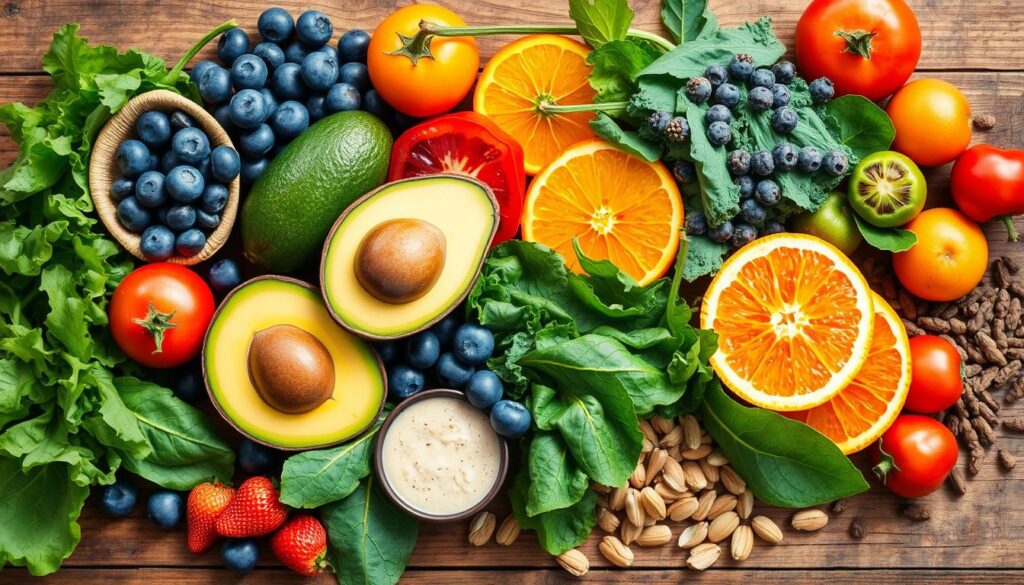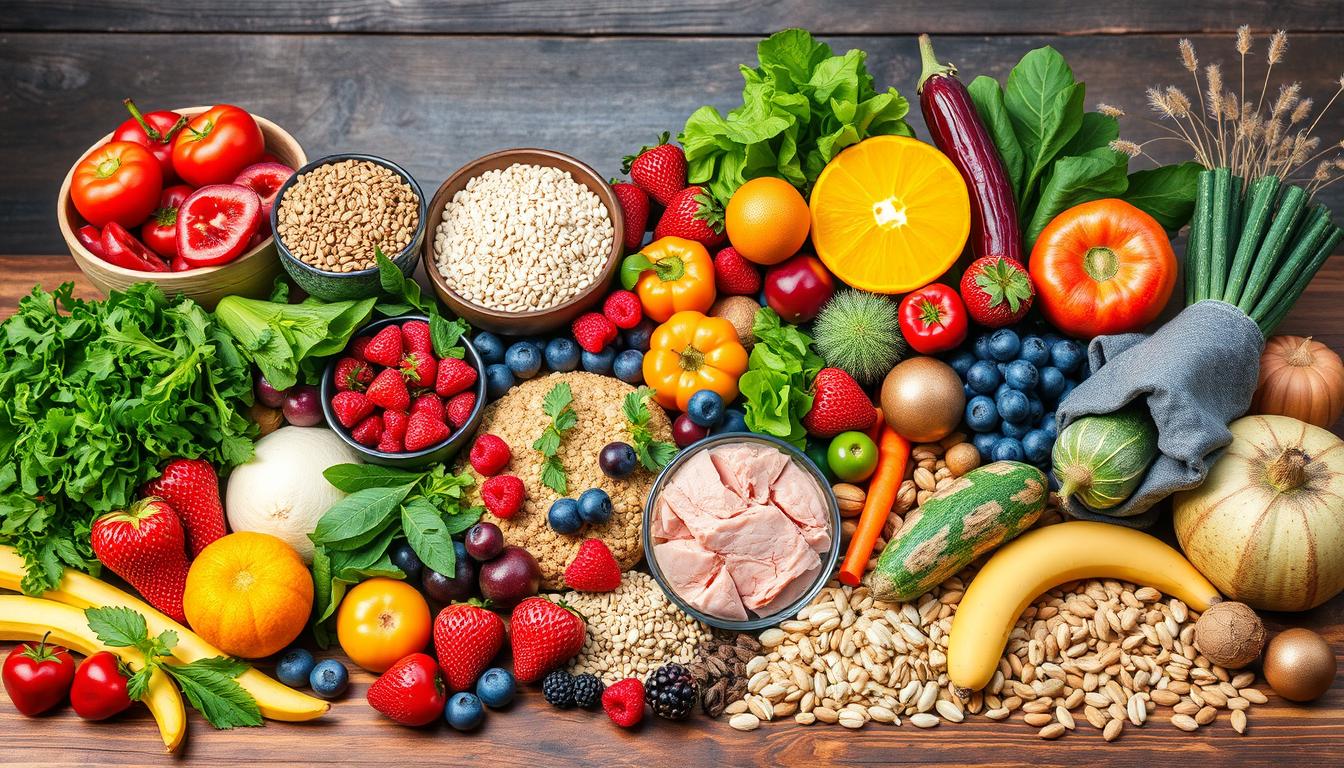Healthy eating focuses on fruits, vegetables, whole grains, dairy, and protein. Most Americans need to eat more fiber, calcium, vitamin D, and potassium. They should also eat less sugar, saturated fat, and sodium.
A balanced diet should have a variety of colors on your plate. Fruits and vegetables are full of vitamins, fiber, and minerals. The goal is to eat the right amount of calories for your activity level.
Key Takeaways
- Emphasize a variety of nutrient-dense foods like fruits, vegetables, whole grains, and lean proteins.
- Reduce intake of added sugars, sodium, and saturated fats to support overall health.
- Strive to meet recommended levels of essential vitamins, minerals, and nutrients.
- Maintain a balanced calorie intake aligned with your physical activity level.
- Incorporate healthy eating habits and mindful portion control for sustainable weight management.
Understanding the Foundations of Balanced Nutrition
Keeping a balanced diet is key for good health. It includes daily calories, macronutrients, and essential nutrients. These elements help our bodies function well.
Daily Caloric Requirements and Macronutrients
Men need about 2,500 calories a day, while women should aim for 2,000. But, these numbers can change based on age, activity, and health.
A balanced diet should have starchy carbs, making up over a third of what we eat. It’s best to choose whole-grain carbs. Protein is also vital for new cells and should be part of our meals.
Role of Essential Nutrients in Body Functions
Essential vitamins and minerals are key for our bodies. They help our immune system, bones, and metabolism. Eating a variety of foods is important for getting these nutrients.
Building a Balanced Plate for Optimal Health
A balanced plate should have fruits, veggies, whole grains, and lean proteins. Heart & Stroke suggests filling half your plate with veggies and fruits. This ensures you get lots of vitamins, minerals, and fiber.

Understanding balanced nutrition and applying it in your diet supports your health. A balanced diet is more than counting calories. It’s about nourishing your body with the right nutrients.
Smart Food Choices for Better Health
Making smart food choices is key to a healthy life. Eating foods rich in nutrients helps your body stay healthy. Try to eat a variety of fruits and veggies, aiming for five servings a day.
These foods are full of vitamins, minerals, and antioxidants. They help keep your immune system strong and lower disease risks.
For protein, choose lean meats and eat fish twice a week. Salmon and mackerel are great choices because they’re rich in omega-3s. Nuts and seeds are also good for protein, fiber, and healthy fats.
Try to eat less of foods high in bad fats like fatty meats and fried foods. Instead, go for unsaturated fats in plant oils, avocados, and olives. Also, drink water, unsweetened teas, or black coffee instead of sugary drinks.
Nutrient-Dense Food Choices for Better Health
- Aim for at least 5 portions of fruits and vegetables per day
- Include 2 servings of fish per week, with one being an oily fish high in omega-3s
- Choose lean cuts of meat and reduce processed meat intake
- Opt for unsaturated fats from plant-based oils, avocados, and nuts
- Limit foods high in saturated and trans fats
- Replace sugary drinks with water, unsweetened teas, or black coffee
By choosing these foods, you give your body what it needs to be healthy. Small changes can make a big difference in your health over time.

Nutrition Tips for Sustainable Weight Management
Keeping a healthy weight is key for your overall health. By controlling portions, eating mindfully, and timing meals right, you can manage your weight well.
Portion Control Strategies
Portion control is vital for weight management. Aim for 25 to 30 grams of fiber daily to stay full. Use visual guides like a fist for veggies and fruits, a tennis ball for grains, and a deck of cards for proteins.
Mindful Eating Practices
Practicing mindful eating can greatly help with weight management. Eat slowly, enjoy your food, and don’t get distracted. This helps you make better food choices and understand your hunger and fullness better.
Timing Your Meals Effectively
When you eat matters for weight management. Don’t skip breakfast to keep your hunger and metabolism in check. Eat and snack every 3-4 hours to keep your energy steady and avoid overeating.
By following these nutrition tips, you can control your weight and see lasting results. Remember, being consistent and making small changes can lead to big health improvements.

“Successful weight loss depends on reducing total caloric intake by eating nutrient-rich foods and increasing physical activity to achieve a negative energy balance.”
The Power of Whole Foods and Natural Ingredients
Whole foods and natural ingredients are key to a healthy lifestyle. They are full of nutrients our bodies need to stay healthy.
Foods like fresh fruits, veggies, whole grains, lean proteins, and healthy fats are rich in fiber and vitamins. They also have minerals and antioxidants. On the other hand, ultra-processed foods have added sugars, unhealthy fats, and artificial additives. These can harm our health.
Studies show that eating whole foods helps keep a healthy weight and body fat. A study in the Journal of Nutrition found that whole food diets lower the risk of obesity, high blood pressure, and type 2 diabetes.
Using natural ingredients when cooking at home is also good for your health. Eating whole grains, for example, can help prevent cancer and heart disease. It’s recommended to have at least three servings of whole grains a day.
By focusing on whole foods and natural ingredients, you can improve your health. A balanced diet is the base for a healthier life.
“Whole foods are the best source of nutrients to fuel your body and support your health.” – Nutrition Expert
| Whole Foods | Benefits |
|---|---|
| Fruits and Vegetables | Rich in fiber, vitamins, minerals, and antioxidants |
| Whole Grains | High in fiber and complex carbohydrates, can reduce disease risk |
| Lean Proteins | Provide essential amino acids for muscle growth and repair |
| Healthy Fats | Support heart health and brain function |
Adding more whole foods and natural ingredients to your diet can boost your health. It’s a step towards a better, more balanced life.
Essential Vitamins and Minerals for Optimal Health
Eating a balanced diet full of vitamins and minerals is key for staying healthy. These nutrients help our bodies work right, from fighting off sickness to keeping our bones strong and our hearts healthy.
Key Micronutrients for Immune Support
Some vitamins and minerals are super important for our immune system. Vitamin C, vitamin D, and zinc help our bodies fight off germs. Eating foods rich in these nutrients, like oranges, fish, and chicken, boosts our immune system.
Food Sources of Critical Vitamins
Eating a variety of whole foods is the best way to get all the vitamins you need. Fruits, veggies, whole grains, and lean meats are packed with vitamins A, B, C, D, E, and K. Eating these foods helps you get the vitamins you need without needing supplements most of the time.
Supplementation Guidelines
While it’s best to get vitamins from food, sometimes supplements are needed. For example, many people over 50 might need vitamin D supplements. Always talk to a doctor to figure out if you need supplements and how much.
| Nutrient | Recommended Daily Intake for Adults 51+ |
|---|---|
| Vitamin A | Men: 900 mcg RAE, Women: 700 mcg RAE |
| Vitamin B1 (Thiamin) | Men: 1.2 mg, Women: 1.1 mg |
| Vitamin B2 (Riboflavin) | Men: 1.3 mg, Women: 1.1 mg |
| Vitamin B3 (Niacin) | Men: 16 mg, Women: 14 mg |
| Vitamin B6 | Men: 1.7 mg, Women: 1.5 mg |
| Vitamin B12 | Men and Women: 2.4 mcg |
| Vitamin C | Men: 90 mg, Women: 75 mg |
| Calcium | Men 51-70: 1,000 mg, Men 71+: 1,200 mg, Women 51+: 1,200 mg |
| Vitamin D | Men and Women 51-70: 15 mcg (600 IU), Men and Women 71+: 20 mcg (800 IU) |
| Vitamin E | Men and Women: 15 mg |
| Folate | Men and Women: 400 mcg |
| Vitamin K | Men: 120 mcg, Women: 90 mcg |
By eating a variety of nutrient-rich foods and using supplements when needed, you can make sure you get all the vitamins and minerals your body needs. This helps keep you healthy and strong.
“Vitamins and minerals are the foundation of good health, supporting everything from our immune system to our bone strength. Incorporating a variety of nutrient-rich foods is the best way to ensure we’re getting all the essential micronutrients our bodies need.”
Smart Strategies for Reducing Processed Foods
Reducing processed foods is key to a healthier lifestyle. These foods are often full of calories, added sugars, unhealthy fats, and sodium. Studies show that over 70% of the sodium Americans eat comes from packaged foods. And 90% of this sodium is from salt.
To fight the bad effects of processed foods, try these smart strategies:
- Read Nutrition Labels: Look closely at the labels on packaged foods. Find hidden sugars, sodium, and other bad ingredients. Choose products with fewer and more familiar ingredients.
- Prepare Meals at Home: Cooking with fresh, whole ingredients lets you control what you eat. It helps cut down on processed foods and ensures a healthier diet.
- Prioritize Whole, Minimally Processed Foods: Focus on whole foods like fruits, vegetables, whole grains, lean proteins, and healthy fats. These foods are full of vitamins, minerals, and fiber, missing in processed foods.
- Limit Ultra-Processed Food Consumption: In the U.S., 58% of daily calories come from ultra-processed foods. Try to eat less of these foods. They’re linked to a higher risk of chronic diseases, including cancer.
By using these strategies, you can cut down on processed foods. This leads to a healthier diet. Eating whole, minimally processed foods greatly improves your health and lowers disease risks.
“Reducing the consumption of ultra-processed foods by just 10% in the diet can result in a 4% reduction in overall cancer risk, a 27% drop in hepatocellular carcinoma risk, and a 20% decrease in esophageal squamous cell carcinoma risk.”
Starting a healthier lifestyle is all about small, lasting changes. Making smart food choices and cooking at home helps you control your health. Enjoy the benefits of a balanced, nutrient-rich diet.
Hydration and Its Impact on Nutritional Health
Drinking enough water is key for good health and body function. Experts say we should drink 6 to 8 glasses of water a day. Water is the best choice. It’s important to avoid sugary drinks and alcohol because they add calories and can dehydrate us.
Water helps our body digest food, absorb nutrients, and get rid of waste. It also keeps our body temperature stable and blood flowing well. We need to drink more water when it’s hot or when we’re active to replace lost fluids.
How much water we need can change based on our activity level, where we live, and our health. The U.S. government and health groups offer tips on staying hydrated. They suggest choosing drinks that are low in calories and sugar for better nutrition.















Leave a Reply